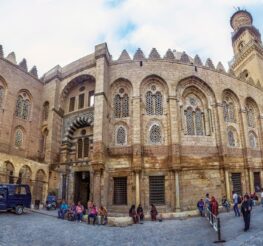Galal Amin: The Tragic Loss of a Brilliant Educator, an Eloquent Writer, and an Outspoken Intellectual
25 January Revolution cairo city city life egypt Egyptian Revolution Egyptians Galal Amin Hosni Mubarak Whatever Happened to the Egyptians
Cairo 360
Born in 1935, the son of Egyptian jurist and academic Ahmed Amin, who was himself an academic rival of Taha Hussein, raised on the highest standards of education and culture, starting life as an economist, an educator at top universities, and an author of several popular and insightful economic books, we now mourn the loss of Galal Amin, one of Egypt’s most notable economists and writers.
Galal Amin started his education in Egypt before moving on to gain a master’s degree and Ph.D. in economics from the prestigious London School of Economics. Over the course of ten years, Amin had a hugely successful career in academia, teaching economics at Ain Shams University from 1964 to 1974. He was also the advisor for the Kuwait Fund for Economic Development during his final five years at Ain Shams University. Next up was an international academic path, as Galal Amin spent a year teaching at UCLA from 1978 to 1979, before moving back to Egypt and teaching at the AUC.
As a writer, Galal Amin was very politically opinionated, and was never afraid to say how he felt. He published his first book in 2000, titled Whatever Happened to the Egyptians? (2000), followed by somewhat of a sequel in 2003 titled Whatever Else Happened to the Egyptians? (2003). Throughout these two books, Amin eloquently recounted his views on Egypt’s economy, as well as managing to outline the effects of Egypt’s political regime on society and economics. In his third book, The Illusion of Progress in the Arab World (2006), Amin offered a very strong criticism of the Arab world’s political regimes.
At the 2012 Cairo International Book Fair, the outspoken economist and writer publicly delivered a very articulate commentary on how the ideal of poverty has come to change. “The poor used to have a sense of contentment because of their belief that nothing could be done about their situation. But now the poor are better dressed, but suffer a deep sense of humiliation.” Galal Amin added that they “see that their ambitions for a better life are not being met, despite better education. Thanks to television, everyone understands their deficiency and feels more excluded.”
After the revolution, of which Galal Amin was a strong supporter, he released his 2011 book Egypt in the Era of Hosni Mubarak. This book summarised Amin’s views on the former President’s 30-year rule of Egypt. He then published a book called Whatever Happened to the Egyptian Revolution? (2013). This book analysed the ways in which economic corruption negatively affected the lives of the poor and middle class, in a manner that planted and watered the seeds of the 2011 revolution.
His life of giving is not to be forgotten, his students will keep the memory of having been taught by him for the rest of their lives, and his written words will remain in our thoughts, and through that, so will he. Egypt will always be proud to have had such a man.
recommended
 Arts & Culture
Arts & Culture
The Coptic Museum: The History of Egypt to the Tunes of Psalms of David
arts & culture cairo museums +4 Health & Fitness
Health & Fitness
Egyptians in the 2024 Summer Olympics
Egyptians in the Olympics Olympics +1 City Life
City Life
Weekend Guide: Bazar by Sasson, Memo, The Cadillacs, Heya Bazaar, Dou, Nesma Herky & More
Concerts The Weekend Guide +2 Arts & Culture
Arts & Culture

